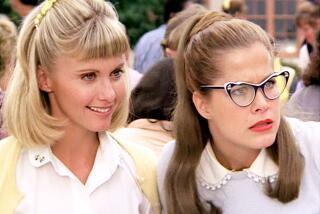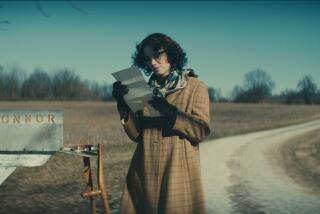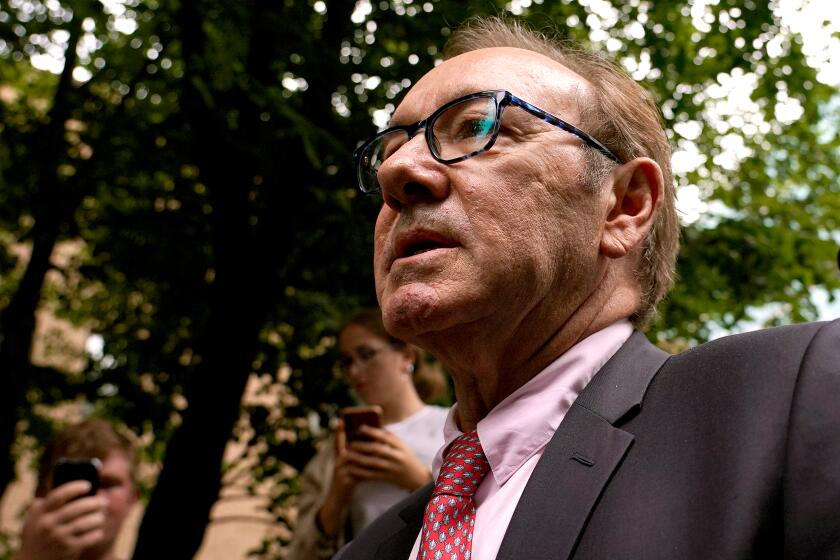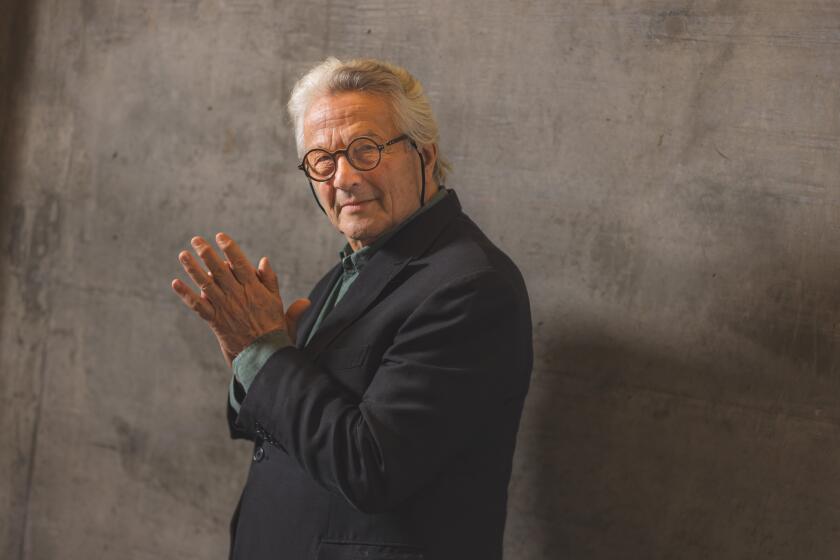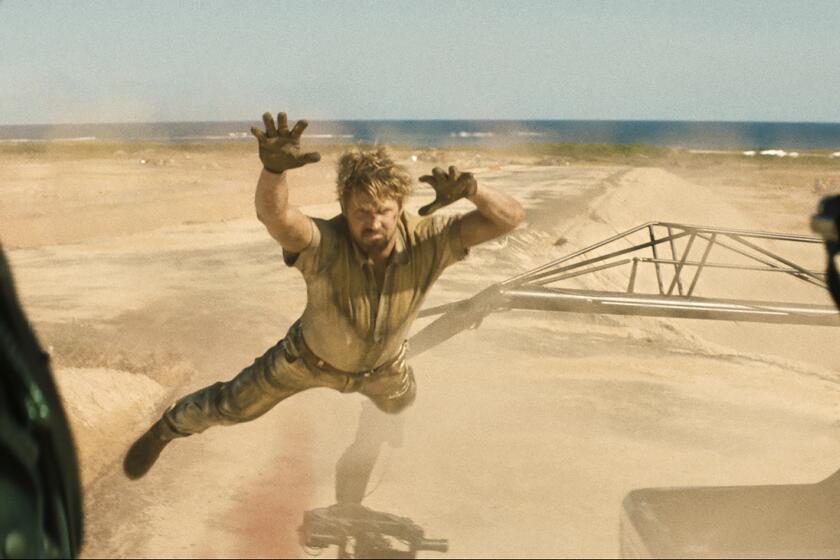They’ve Projected the Offbeat on Their L.A. Screens for 50 Years
During the years when I was principally a movie reviewer, I used to tell Max Laemmle, more than half seriously, that it was his theaters that kept me at it.
The satisfactions of the reviewer’s trade are in grappling with the tough ones--the films that test the boundaries of the medium, that are enigmatic and provocative and treat the audience with respect instead of patronizing contempt.
For the record:
12:00 a.m. Nov. 23, 1988 For the Record
Los Angeles Times Wednesday November 23, 1988 Home Edition Calendar Part 6 Page 8 Column 1 Entertainment Desk 1 inches; 16 words Type of Material: Correction
Kurt Laemmle left film exhibition for a career in life insurance. He has not died, as reported in Tuesday’s Calendar.
There are never many films of that tensile strength, and through the late ‘60s and the ‘70s it seemed to me that I caught most of them in the worn, warm comfort of the Laemmles’ Los Feliz, up on Vermont, and later at the Royal, which is now their flagship, on Santa Monica in West Los Angeles.
Remarkably, in an industry so strewn with change and upheaval, the Laemmles are this season observing their 50th year in exhibition in Los Angeles. It was in 1938, just ahead of the war, that German-born Max Laemmle, who is now 83, came to Los Angeles from Paris and, with his late brother Kurt, leased two small neighborhood theaters in Highland Park.
Kurt began operating the theaters while Max went back to Paris to collect his wife, Bobbi, and their son Bob. Max, a cousin of the legendary Uncle Carl Laemmle of Universal, had been working for the studio in Europe but he was now on his own.
“My father always dreamed of running an art theater,” Bob Laemmle said not long ago. “But the Dale and the Franklin were regular neighborhood theaters, changing the bill twice a week, giving away dishes, the whole thing.”
Max acquired a third house in Highland Park. Then in the early 1940s he leased the Los Feliz, which, like their other theaters, was then what was called a subsequent-run operation, playing Hollywood films a week or two or three after their first release.
Bob Laemmle started in the business by changing the marquee at the Los Feliz. This summer Bob’s son, Gregory, 23, an honors graduate of UC Berkeley, became the first of the third generation of Laemmles to join the firm.
After World War II, television had hit the film business like an earthquake that won’t quit quaking, and it changed the nature of the Laemmle operations as well. “Television,” Bob Laemmle says, “killed the Highland Park theaters.”
But, fortuitously, the end of the war brought the neo-realist films--”Open City,” “The Bicycle Thief” and others--from Italy. They were a startling change from Hollywood films in which just and happy endings were the norm. The dark, tough Italian imports created a whole new audience for foreign films, and the Laemmles found their niche in local film history.
Max put together a French film festival--six films from the New Wave, six classics--and got Pauline Kael to write program notes for it. For an early festival of Orson Welles films, Laemmle persuaded Peter Bogdanovich to do the notes.
The Los Feliz and then the Royal became homes away from home for the great post-war exuberance in French film making: the works of Truffaut, Godard, LeLouch, Chabrol, Resnais. To their relatively small but devoutly loyal audiences, Max & Co. played the brilliantly glum early Bergmans and the second wave of postwar Italians like Marco Bellochio.
“We built a mailing list that was pure gold,” Bob Laemmle says. “but it got so large--6,000 names--that as the postal rates went up it was too expensive to use it.”
On the reasonable grounds that a dark theater is an abomination, Max and Bob and Max’s brother-in-law, George Reese, pioneered in creating festivals, Saturday and Sunday morning series on opera, Shakespeare, psychology; a long-running Wednesday morning series of French films tailored to French teachers and their classes.
Over the years other art-film exhibitors have gone dark permanently (one after a brief flirtation with porno). But the Laemmles have expanded and are still at it. They built the Esquire in Pasadena in 1964, correctly guessing that there was an audience there for foreign films as well as for the Rose Parade. Max also used the Esquire for concerts and hired Lillian Steuber to do the entire Beethoven piano sonata cycle. “Beethoven and popcorn,” Jascha Heifetz said admiringly.
The Laemmles began a tradition of playing shorts and documentary features to qualify them for Academy Award consideration. “We must screen 75% or 80% of them,” says Bob Laemmle.
Occasionally, the Laemmles have taken over troubled theaters, like the Royal itself, which was at the verge of bankruptcy, and the Music Hall, which was closed. “Sometimes,” Bob Laemmle says, “we’ve added theaters out of frustration, because we had more product than we had screens for.” The Laemmles took the Music Hall in Beverly Hills so they’d have someplace to play Ingmar Bergman’s “Scenes From a Marriage.”
Once in a while, defeats have turned out nicely. Max lost out on the original bidding for Claude Lelouch’s “A Man and A Woman.” It played National General’s Lido for 12 weeks until the chain had a commitment to play “Blow Up.” The Laemmles took it over and it ran for a record-breaking total of 94 weeks.
Not all the expansions have worked well. The Sheraton-Grande complex in downtown Los Angeles has not yet found its audiences. But there will likely be a Laemmle complex in the new shopping center on the site of Schwab’s drug store at Crescent Heights and Sunset, and there is talk of a Laemmle outpost in Orange County.
Meantime, Bob Laemmle says, the other independent exhibitors seem to be disappearing, bought out by the chains. “We used to hear from a lot of guys who’d call to chat about what’s coming along. Now we don’t hear from anybody any more. There doesn’t seem to be anybody left.”
The Laemmles themselves recently fended off an overture from one of the chains. “They could squeeze us out if they wanted to,” Bob says. “They’ve got the resources. But I pray they don’t. I don’t know what else we’d do. This is an addictive business. Every film is a new adventure.”
More to Read
Only good movies
Get the Indie Focus newsletter, Mark Olsen's weekly guide to the world of cinema.
You may occasionally receive promotional content from the Los Angeles Times.
